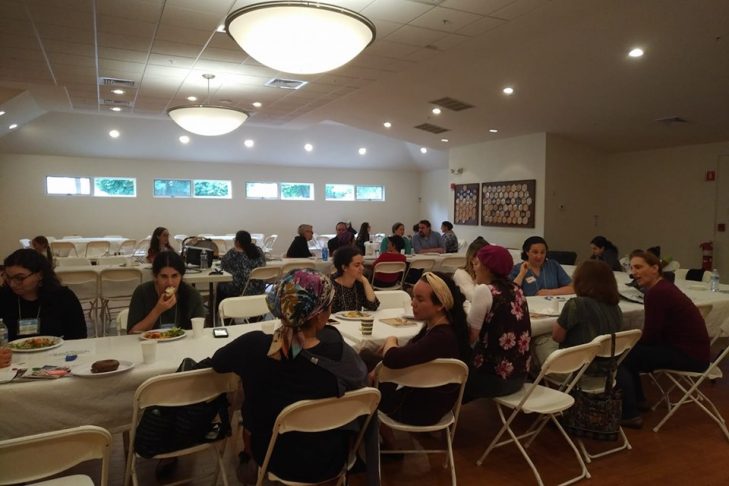A conference for Modern Orthodox women’s leadership made history last week. The BINAH Conference for Orthodox Women Leaders—the word binah in Hebrew refers to women’s wisdom as characterized in rabbinic literature—took place at Congregation Shaarei Tefillah in Newton with 35 attendees. The organizers point out that BINAH is intentionally capitalized to distinguish it from other Modern Orthodox gatherings, and also as a placeholder for a potential acronym. They also note that although the conference began with a relatively small group of attendees, they have big plans for the future of Modern Orthodox women.
The impetus for the conference was last year’s historic gathering of Modern Orthodox leaders ranging from rabbis and graduates from Yeshiva University and the Modern Orthodox rabbinical seminary Yeshivat Chovevei Torah to discuss communal issues. The Tzohar Conference on Society, Education and Welfare, which took place in Israel, offered sessions covering subjects such as “Facing Transformative Changes in Modern Orthodox Communities,” “Singles and Young Professionals: How to Connect Them and To Them” and “Approaches Toward Different Streams of Judaism.”
While last year’s conference was transformative for the Orthodox world, there was one significant drawback: women were not invited to the proceedings. This resulted in a situation where women’s voices were completely absent with the exception of just one panel that addressed “Women and the Orthodox Community.”
The circumstance was urgent enough to move four young Modern Orthodox women—Tzipporah Machlah Klapper, Talia Weisberg, Kayla Blum and Eliana Yashgur—to found The BINAH Conference. The BINAH Conference is not so much a direct response to the lack of women at the Tzohar Conference as it is an answer for how to fill the void of Modern Orthodox women’s leadership.
Writing in The Times of Israel, Klapper noted: “Orthodox women are in a tricky position when it comes to leadership. Take a title and be accused of heresy—do not take a title and be told you are unqualified. And no matter what you do, some men will always want you excluded, and others will accommodate them.”
For BINAH’s organizers, the solution was to answer exclusion with outright inclusion. Klapper told JewishBoston that she and her sister organizers “wanted to do the right thing. We were determined to pay our speakers the going rate, have disability accommodations and provide child care, which was essential at a conference focused on women’s issues. We were, however, determined not to be a women-only conference. Men were welcome to attend.”
In an interview with JewishBoston, Weisberg emphasized that one of the motivations behind BINAH was to showcase Orthodox women leaders coming from diverse backgrounds both religiously and educationally. “Unfortunately, women’s voices aren’t always heard in the Orthodox community,” she said. “There are also issues in Orthodoxy that don’t get discussed. For example, at BINAH we have brought a sociologist who works for the Orthodox Union. She is doing research about the shidduch crisis [a phenomenon in the Orthodox Jewish community where eligible singles, especially women, have difficulty finding a spouse] and talking about it in a new way.”
Other speakers—all women—covered topics that included a discussion of women’s financial status in the Modern Orthodox community, identity, sexuality and navigating interfaith family at holiday times. On its website, the organizers stated: “We will bring together Orthodox women leaders in an enthusiastically Orthodox space, one where we can gather to discuss communal issues on our own terms. We believe that Orthodox women leaders have the passion and power to make our community better for all of us.”
Weisberg observed that it’s an interesting time for Modern Orthodoxy. Women raised as Modern Orthodox are both pious and observant. In the secular world, they are educated professionals who are poised to shatter the glass ceiling. “On some level, there is cognitive dissonance in the religious world,” she said. “We’re a very diverse community with many subsections, so it’s hard to generalize.”
Both Weisberg and Klapper hope The BINAH Conference is the beginning of a conversation that will draw in a broad cross-section of Orthodoxy. “Our community needs to hear Orthodox women leaders, and by this we mean all types of women leaders,” said Klapper. As she wrote in The Times of Israel: “Orthodox women leaders have much to contribute in all areas…they are essential to running every part of our community’s infrastructure. When we deny them a chance to speak, we cut ourselves off from half of our potential.”



